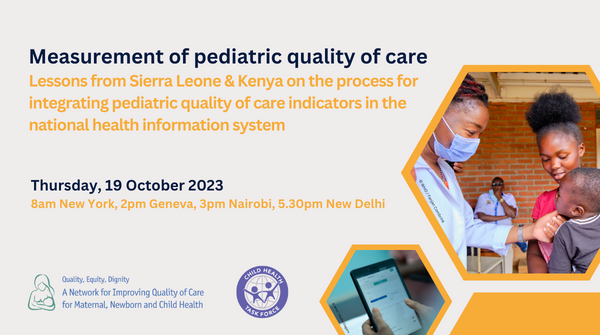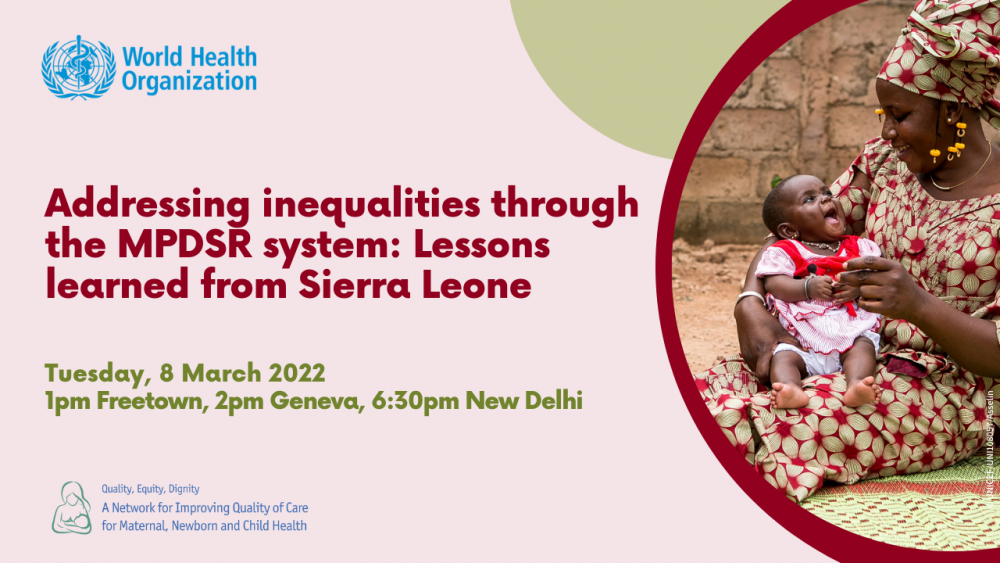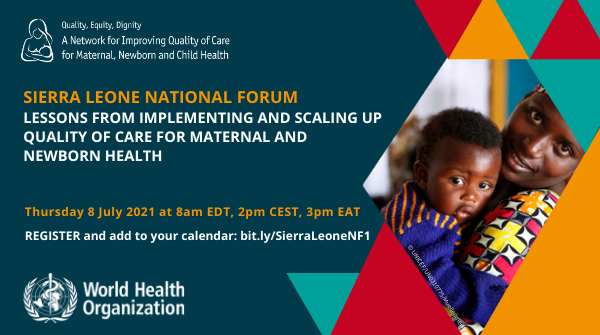Quality of Care in Sierra Leone
With high commitment for Quality of Care (QoC) for MNCH from the government and strong and well-functioning governance structures at all levels, Sierra Leone has successfully developed and progressed with implementing the Quality RMNCH Strategic Roadmap (2020-2024). The Roadmap has four goals Leadership, Action, Learning & Accountability. Initial output indicators are strong. Facility data collected and shared by the Ministry of Health and Sanitation is demonstrating strong reductions in maternal mortality and stillbirth over the 3-year period 2019 to 2021.
Most recent data has identified that Sierra Leone has an 83% institutional delivery and 87% of births are being attended by skilled health personnel (DHIS 2019). The Maternal Mortality Ratio had also shown marked improvement as it had reduced from 1,165 to 717 per 100,000 live births between 2013 and 2019 (DHS 2019). However, a continuing high maternal mortality ratio and high rates of stillbirth and newborn mortality mean that Sierra Leone remains one of the world’s highest burden countries. The Ministry of Health and Sanitation conclude that the critical gaps currently are inadequate human resources, essential supplies, limited funding to support operation in facilities, districts, and QOC management offices and to fund infrastructure improvement and WASH.
The Quality RMNCH Strategic Roadmap (2020-2024) has vitalized the agenda of quality across the Ministry of Health and Sanitation and stakeholders. Implementation of the Roadmap, supported by an effective and commitment Quality of Care Management Team, has encouraged buy-in from partners, helping to bring much needed technical resources to the table, ultimately leading to the development of the National Quality and Patient Safety Policy and Strategic Road Map (2017- 2021). Engagement with regulatory bodies has been prioritized and reforming the health care regulation, licensing and accreditation system has been a critical element to progress moving forward. By the end of 2021, a shared vision of quality of care has been mainstreamed, and this is evidenced in partner and donor programing including in the GFF Investment case for a quality care agenda and multi-stakeholder country engagement for RMNCAH.
During 2021, the implementation package was developed through wide consultation to address MNH standards (PPH, Sepsis, PIH, Stillbirth, and Malnutrition, Diarrhea, Malaria and Pneumonia for Pediatric Standards) in 2021. The WHO Paediatric and Young Adolescent Quality Care Standards were adopted in 2021 and in 2022 Small and Sick Newborn standards will be adopted to be accompanied by an implementation plan to increase coverage and quality of small and sick care units in health facilities.
The 2022 National and District Planning exercise was completed with Quality Care and Patient Safety priorities integrated. Thirty-six hospital and district Quality of Care and Patient Safety Officers were appointed in 2021, which is a strong commitment to expanding and sustaining quality in RMNCH services. A priority action for 2022 is to create an enabling environment for these Quality of Care and Patient Safety Officers. Sierra Leone has prioritised the institutionalization of clinical meetings, mortality reviews and near miss reviews to strengthen facility level surveillance and response to maternal and perinatal deaths.
Over the past two years, the disruption of services due to COVID-19 has hampered the overall implementation, especially activities related to measurement and learning, by reduced onsite support to learning district and slowed QI projects implementation Despite these difficulties, Sierra Leone continued to use QI data for learning purposes and a culture to use data has grown, supported by the inclusion of Quality Care dashboard introduced into DHIS-2. The digitalization of QI monitoring is earmarked for 2022. The establishment of mechanisms for community participation integration into quality care planning in learning district through developing community engagement guidelines for quality care, devising and implementing community scorecards and initiating community engagement programs in districts are also prioritized for 2022. The documentation of lessons learned and best practices will be undertaken through 2022 supported by the Network Secretariat.
WHO Sierra Leone, in close collaboration with the Ministry of Health and Sanitation, have documented Sierra Leone's extraordinary efforts in implementing quality of care for MNCH and reducing maternal mortality in the following documentary. It calls for urgent action to save the lives of women and children in Sierra Leone and to accelerate progress towards achieving the SDG target of 70 maternal deaths per 100 000 births by 203o.





